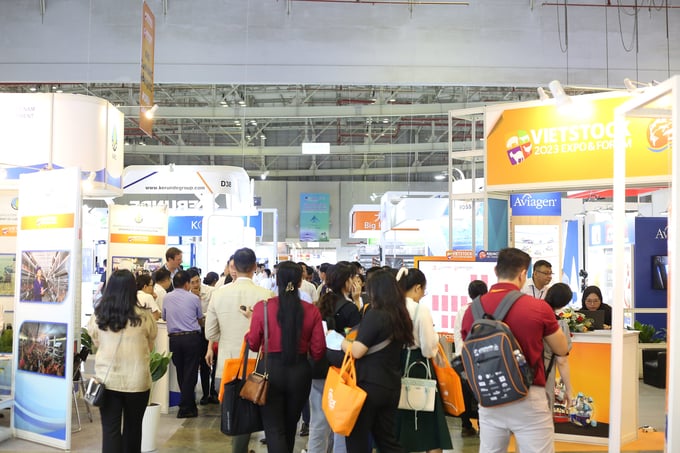June 15, 2025 | 21:25 GMT +7
June 15, 2025 | 21:25 GMT +7
Hotline: 0913.378.918
June 15, 2025 | 21:25 GMT +7
Hotline: 0913.378.918
Vietnam has a relatively small land area, ranking 66th in the world, and a population ranking 15th in the world, but its production and livestock capacity rank among the top in the world.
Over the past 10 years, Vietnam's livestock industry has sustained a growth rate of 5 - 7%; meat production has nearly doubled, egg production has more than tripled, fresh milk production has quadrupled, and the production of industrial compound feed has nearly doubled. This has made the Vietnamese market highly attractive to foreign investors, opening up numerous investment and business opportunities.
Ms. Rungphech (Rose) Chitanuwat, Regional Portfolio Director - ASEAN, Informa Markets, stated that agriculture in general and livestock in particular are the foundation and contribute an important part to Vietnam's GDP. Vietnamese consumers are very fond of meat products, so the livestock industry is closely linked to national development.
"However, in addition to available domestic resources, Vietnam needs more innovations and new technologies to help livestock farmers produce more efficiently", emphasised Ms. Rungphech Chitanuwat.

Ms. Rungphech (Rose) Chitanuwat, Regional Portfolio Director - ASEAN, Informa Markets, stated that agriculture in general and livestock in particular are the foundation and contribute an important part to Vietnam's GDP. Photo: Hong Tham.
Ms. Rungphech Chitanuwat said: “We have heard a lot about trends, such as food security, food safety, and sustainability. Vietnam is now not only able to meet domestic demand but also able to provide better, safer products and develop agriculture in a sustainable way”.
“I would like to reiterate that innovation and technology are two factors that Vietnam’s livestock industry needs today. Foreign investment or technology and knowledge transfer will help improve and develop the livestock industry, increase productivity and make better use of available resources”, Ms. Rungphech Chitanuwat emphasised.
Vietnam’s Premier International Feed, Livestock, Aquaculture & Meat Industry Show will be held on 9 - 11 October 2024 at Saigon Exhibition & Convention Center, Ho Chi Minh City, Vietnam (Vietstock 2024), Ms. Rungphech Chitanuwat believes that Vietstock can bring about technology transfers and new cooperation, and discussions between government, organisations and businesses to together promote the development of the industry.
“We will help livestock farmers and small businesses address challenges from disease and price fluctuations”, Ms. Rungphech Chitanuwat affirmed.
According to Mr. Pham Kim Dang, Deputy Director of the Department of Livestock Production (MARD), regarding trends, we can affirm that Vietnamese livestock farming is currently developing in the right direction as defined in our livestock development strategy for 2021 - 2030 and the vision for 2045, which is to develop the livestock industry towards a modern, concentrated commodity-oriented approach and sustainable development. To achieve sustainable livestock development, we must address four crucial factors.
Firstly, economic efficiency. Secondly, environmental protection. Thirdly, social equity for all actors involved in the livestock production chain. And for livestock farming, a very important aspect is ensuring animal welfare. These are four crucial factors determining the sustainable development of livestock farming in the current trend.
Livestock farming in Vietnam, like global livestock farming, is transitioning towards the "four betters" that the Food and Agriculture Organization of the United Nations has established and oriented for agriculture in general and the livestock industry in particular. And that is also the theme of the Vietstock 2024.
The four "betters" that the livestock industry should aim for are better production, better nutrition, a better environment, and a better life. Here, we want to emphasise a better life. That means ensuring the development of livestock farming and ensuring fairness for all actors involved in the livestock production chain. For Vietnam, these are the farmers who are directly involved in livestock production, and who have not been adequately protected in terms of rights when there are market fluctuations.

Vietstock can bring about technology transfers and new cooperation, and discussions between government, organisations and businesses to together promote the development of the industry. Photo: Hong Tham.
In terms of solutions, as outlined in the strategies, plans, and policies, we will continue to focus on legal dissemination, effectively implementing five projects, and leveraging resources from livestock development support policies to improve livestock efficiency, which was recently approved by the government.
In addition, we will link production to the market, to market demands, and market orientations with a focus on developing a circular economy, green agriculture, and reducing emissions to protect the environment.
Applying high technology and precision technology in conjunction with digital transformation to ensure traceability and food safety. Strengthening value chains to increase the value added of products to enhance the competitiveness of livestock products.
Subsequently, applying slaughterhouse and processing technologies, especially deep processing, to increase the value of livestock products to be competitive in the trend of global trade integration and applying technological solutions to ensure biosafety, disease safety, and antibiotic alternatives to reduce the problem of antibiotic resistance, which is currently a major challenge for the livestock industry.
Finally, it is to encourage investment in the production of raw materials and inputs for livestock, especially feed, of course, the materials that we have advantages and competitive potential to reduce our dependence on imported materials from other countries.
Translated by Hong Tham

(VAN) The working delegation from the Ministry of Agriculture and Environment conducted an important trip to the Netherlands to strengthen strategic partnerships and sustainable development in the agricultural sector.

(VAN) The letter ‘A Plea from the Ocean’ not only evokes emotion but also awakens the human conscience to the responsibility of protecting life on Earth.

(VAN) The Department of Agriculture in South Africa has announced the country’s first mass vaccination of poultry to prevent local birds from contracting avian influenza.

(VAN) Establishment of the Mekong Delta Regional Agricultural Linkage Center, aiming for a closed value chain, deep processing, trading platforms, and international market connectivity.

(VAN) Gia Lai province has recently recorded 460 rare species of animals and plants, contributing to forest conservation and biodiversity planning in the region.

(VAN) Ms. Caroline Beresford, New Zealand Ambassador to Vietnam, expressed confidence that agricultural cooperation between Vietnam and New Zealand will develop sustainably, be climate-resilient, and promote gender equality.

(VAN) Vietnam reaffirms its commitment to international cooperation in fostering sustainable and responsible fisheries while ensuring resilient livelihoods for small-scale fishing communities.